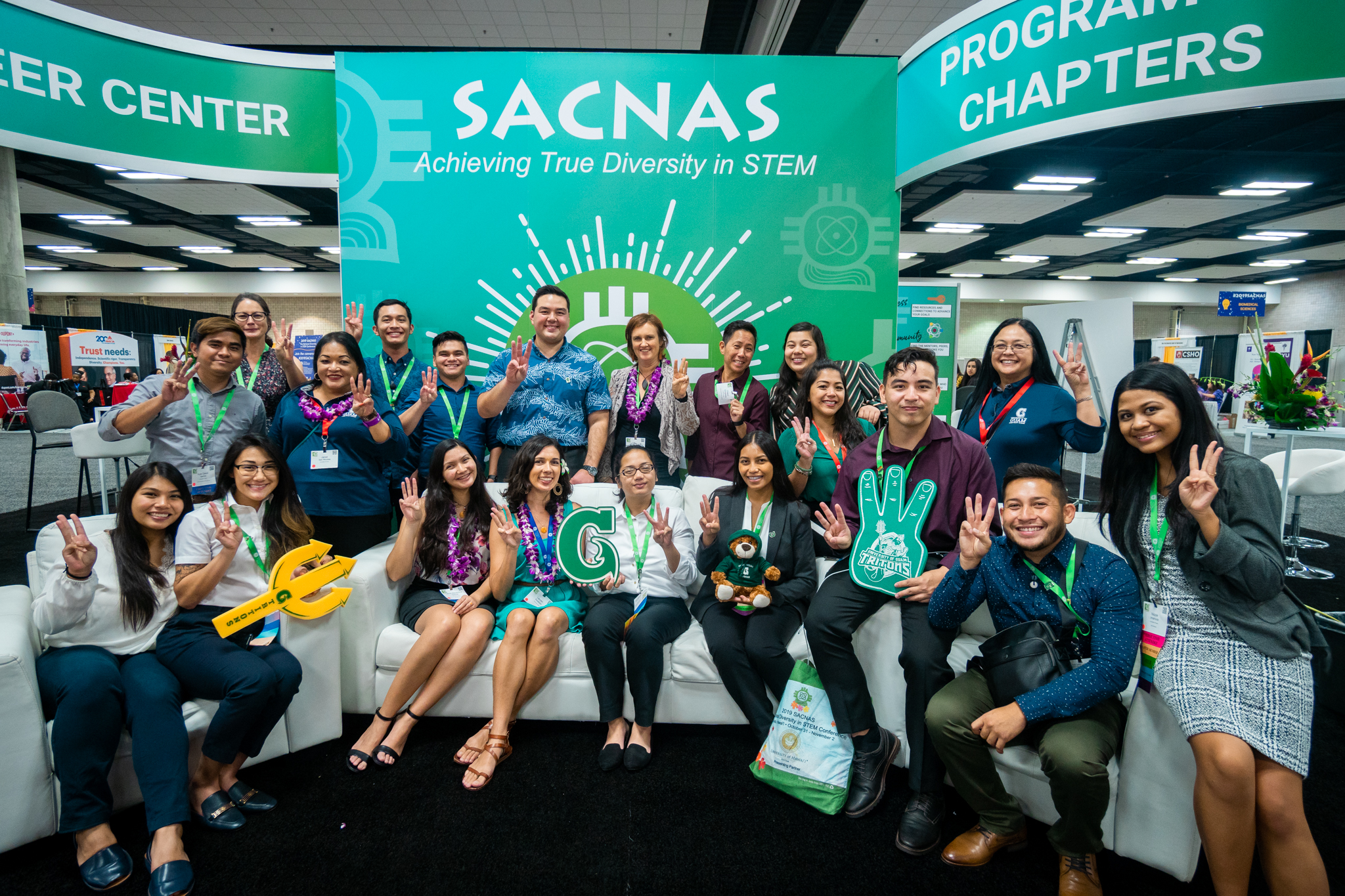


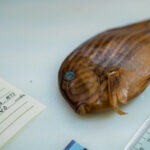







Overview
Guam EPSCOR is funded by a 5-year, $20 million grant to the University of Guam from the National Science Foundation. The program aims to develop a Guam Ecosystems Collaboratorium for Corals and Oceans to ensure the sustainability of coral reef ecosystems in the face of environmental change. Guam EPSCoR aims to situate Guam as a premier research and STEM (Science Technology, Engineering and Mathematics) education hub bolstering sustainability, economic development, and informed decision-making by engaging communities in 21st-century science.
In addition to its research goals, Guam EPSCoR seeks to increase the number and diversity of students who choose STEM careers by engaging students in its Student Research Experience (SRE) Program. The SRE program is a program open to undergraduate students seeking research opportunities. Student research training and tasks may include field work to investigate coral reefs or to deploy and retrieve oceanographic instruments, as well as work in the University of Guam Marine Laboratory’s Molecular Lab. Selected students will learn about DNA extraction and sequencing and/or how to readout and analyze data to characterize marine environments. Ideal candidates are self-motivated, well organized, and have basic training or experience in lab procedures and microscopy.
The University of Guam and Research Corporation of the University of Guam are Equal Opportunity Employers that have received NSF funding to broaden the participation of underrepresented students in STEM fields. As such, the SRE Program remains open to all qualified students, but women, minorities, and students with disabilities are particularly encouraged to apply.
Program Eligibility and Requirements
ELIGIBILITY:
- Must be a U.S. citizen and/or permanent resident of Guam
- Undergraduate student in good academic standing (UOG or GCC)
- Must be able to commit 10 hours a week between January 2025 – December 2025. Schedules to be determined with Faculty Mentor.
- STEM Students preferred, ALL Students welcome.
BENEFITS
- Research Experience and Training
- Faculty/Researcher Mentoring
- Near-Peer Mentorship
- $6000 stipend ($500 monthly)
- National STEM Conferences
- Potential Travel Opportunities 3
Guam EPSCoR is seeking to fill four (4) Undergraduate Student Research Experience positions!
Application
Undergraduate students that meet the eligibility requirements and have an interest in EPSCoR Research should apply following the steps below:
- Educate yourself about NSF EPSCoR GECCO. Please ensure you meet the eligibility requirements.
- Apply to be in the EPSCoR GECCO Student Research Experience!
- Complete the online form linked below.
- Submit documentation to epscorsres@triton.uog.edu
- Unofficial transcripts
- Any supplemental documentation, i.e. resume or CV
- All email submissions should have a clear subject line:
- Example: “NSF EPSCoR GECCO SRE Application Documents – Last Name, First Name”
Key Dates
- Application Opens: October 1, 2024
- Applications Close: October 31, 2024
- Selection Notification: November 22, 2024*
- Program dates: January to December 2025
*Upon notification of acceptance, applicants will have 1 week to confirm acceptance.4
For more information, contact:
Guam EPSCoR Student Programs at epscorsres@triton.uog.edu or epscorstudentprograms@triton.uog.edu
For specific questions regarding programming or research experience, please contact:
Hannah Perez, EPSCoR GECCO Education and Workforce Development Project Associate
perezh8997@triton.uog.edu
Student Research
Tropical coral reefs are under many threats due to a rapidly changing climate that affects reef health.
SRE students will have opportunities that include tank experiments and field work to study coral health and resilience to environmental stress. As part of EPSCoR project, we describe the biological and physical characteristics of Guam’s coastal ocean.
To understand near-shore dynamics of our oceans, students may be involved in deploying and retrieving oceanographic instruments, and analyzing data to characterize our near-shore environments.
Genetic variation among individuals may affect the response of corals to the thermal stress posed by increasing sea surface temperatures. There will be opportunities to learn the genetic methods employed to study the response of corals to environmental change and use genetic barcoding for species identification to help elucidate Guam’s coral diversity.
Depending on student interest, training in molecular laboratory skills, including DNA extractions, polymerase-chain reaction, gel electrophoresis, DNA sequencing and analyses may be part of the internship.
Lastly, students may contribute to the EPSCoR Biorepository, a growing collection of Guam’s biodiversity to support research, as curatorial assistants. Specimens collected by students will be integrated into the collections, including tissue preservation, photographic documentation, data base utilization and maintenance of collections.
EPSCoR Faculty Mentors and Research
Interested applicants may indicate a preference for advisors and research areas. While preference will be considered in the application process, students will be assigned to an advisor. EPSCoR Mentors will work with students to develop a research project that aligns with student interests!
Advisor: Christopher Lobban, Ph.D.
Advisor: Robert Lasley, Ph.D.
Despite hundreds of years of exploration, most of the world’s marine invertebrate fauna remains unknown. For many groups of organisms, even the most fundamental knowledge—i.e., “what is it?”—has not been studied. Documenting this baseline data is imperative, especially given the current biodiversity crisis. We focus on discovering, documenting, and disseminating data on Guam’s diverse crustacean fauna. We do field collections, curation, and biodiversity research. Students will conduct field surveys (SCUBA, intertidal, snorkel, etc.) to build a list of crustaceans in Guam and/or conduct taxonomic, phylogenetic, or biogeographic research on their favorite marine species.
Advisor: Bastian Bentlage, Ph.D
Near Peer Mentorship



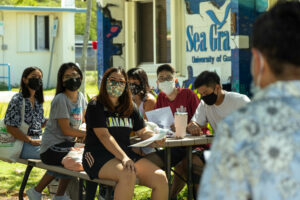
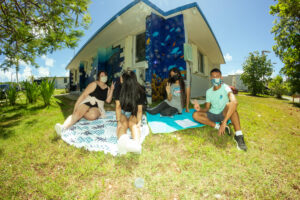


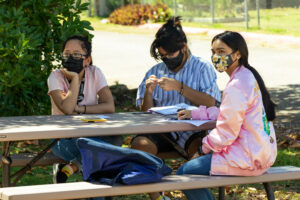

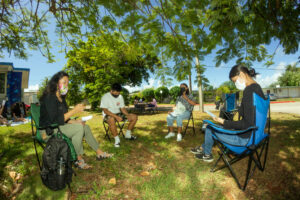

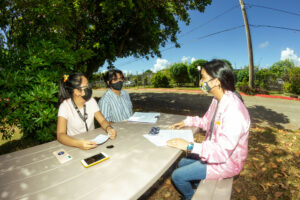


EPSCoR SRE’s will participate in near-peer mentorship programs that place like-minded people pursuing STEM Research in positions to mentor each other and benefit from growth opportunities. You will share experiences with NSF SEAS Island Alliance INCLUDES and EPSCoR students of all levels; high school, undergraduate, and graduate students.
You will never be or feel alone! If you have questions, you can ask a graduate student who has done what you are doing! EPSCoR prides itself on building a supportive and diverse STEM community!
STEM Conferences
- All
- Gallery Item
Student researchers are expected to present research at STEM Conferences! Students will have the opportunity to network with like-minded people! EPSCoR also encourages students become involved in sustainability!
This material is based upon work supported by the National Science Foundation under Grant Number OIA-1946352.
Any opinions, findings, conclusions, or recommendations expressed in this material are those of the author(s) and do not necessarily reflect the views of the National Science Foundation.
Address
University of Guam
Unibetsedȧt Guahan
UOG Station
Mangilao, Guam 96923
Tel: (671) 735-0130
guamepscor@gmail.com
© 2025 Guam EPSCoR. All rights reserved.
















